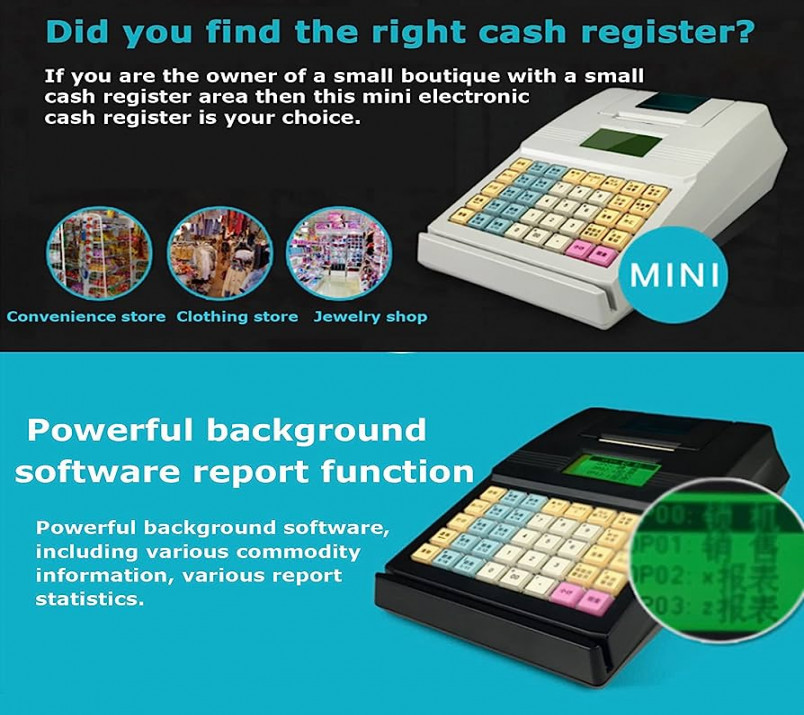
Cash Register For Your Small Business: A Guide to Choosing the Right One
As a small business owner, you may have found yourself wondering whether or not you need a cash register. The answer is a resounding yes! A cash register is an essential tool for any business looking to efficiently manage its finances. In this article, we will explore the benefits of using a cash register and provide you with tips on how to choose the right one for your small business.
Benefits of Using a Cash Register
Using a cash register comes with several advantages, including:
1. Organizing Your Transactions
A cash register will help you keep track of all your transactions, making it easier to organize your finances. It will allow you to enter sales, returns, discounts, and other information accurately, so you always know how much money you have coming in and going out.
2. Save Time and Effort
Using a cash register means you no longer have to manually calculate your sales, making the process more efficient and accurate. This means you can spend less time doing bookkeeping tasks and more time growing your business.
3. Prevent Mistakes
A cash register will significantly reduce the chances of errors in your transactions, which can be costly for your business. You can set your cash register to calculate taxes, discounts, and other necessary adjustments, saving you from making costly mistakes manually.
4. Improve Customer Service
Customers expect quick and efficient transactions when shopping at your store. A cash register can speed up the checkout process, allowing customers to get in and out of your store quickly, improving their overall experience.
How to Choose the Right Cash Register for Your Small Business
Choosing the right cash register can be overwhelming, but it doesn’t have to be. Here are some tips to help you select the best one for your small business:
1. Consider Your Business’s Needs
Take into account the size and type of your business, the volume of sales, and the type of products you offer when choosing a cash register. A small business with few transactions will have different needs than a large-scale operation.
2. Evaluate the Features
Consider what features you need in a cash register. Do you need a scanner to read barcodes? Will you be accepting credit card payments? Do you need to track inventory? Make a list of the features you require, and then find a cash register that meets those needs.
3. Check the Price
The price of a cash register can vary widely, depending on the features and complexity. Make sure you have a budget in mind, so you can narrow down your options and choose a cash register that fits your financial plan.
4. Look for User-Friendly Interfaces
Choose a cash register with a user-friendly interface. It should be easy to set up and use, even for employees with little or no experience using a cash register.
5. Consider Customer Service
Choose a cash register brand that has excellent customer service. In case you encounter any problems, you want to be sure that you can get help immediately and get back to running your business as soon as possible.
6. Buy From a Reputable Dealer
Choose a reputable dealer that offers warranties and support for the cash register. You want to be sure that you are getting a high-quality product that will last for a long time.
FAQs
1. Can I use a cash register for inventory management?
Yes, some cash registers come with features that allow you to keep track of your inventory and make it easier to order new stock when you need it.
2. Do I need a cash register if I have a POS system?
A point-of-sale (POS) system is a more advanced version of a cash register that offers additional features such as inventory management and customer relationship management. However, a cash register is still a useful tool, especially if you are just starting your business.
3. What should I look for when choosing a cash register for my business?
You should take into account the size and type of your business, the volume of sales, and the type of products you offer when choosing a cash register. You should also evaluate the features you need, check the price, and look for user-friendly interfaces.
4. How often should I replace my cash register?
The lifespan of a cash register depends on the brand, model, and usage. However, most cash registers last for five to seven years before requiring replacement.
5. Can I use a tablet as a cash register?
Yes, several tablet-based cash registers are available in the market that allows you to use your tablet as a cash register, making it a cost-effective and efficient option for small businesses.
Conclusion
A cash register is an essential tool for small businesses looking to manage their finances efficiently. It provides numerous benefits, including transaction organization, time-saving, preventing mistakes, and improving customer service. When choosing a cash register, consider your business’s needs, evaluate the features, check the price, look for user-friendly interfaces, consider customer service, and buy from a reputable dealer. By following these tips, you can choose the best cash register for your business, ensuring that you can manage your finances effectively and grow your business.















Discussion about this post